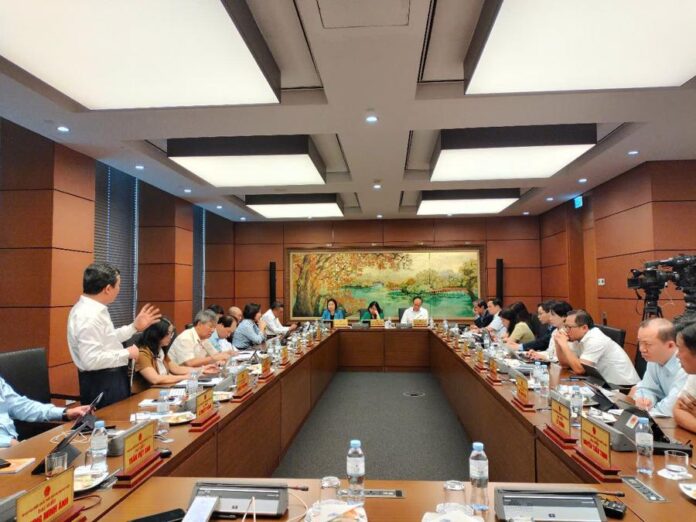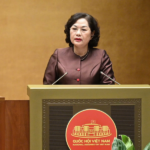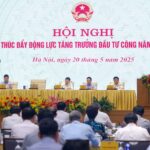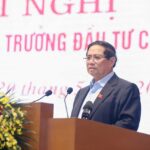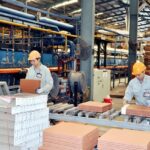In his discussion on socio-economic development, on May 23, Deputy Hoang Van Cuong of Hanoi proposed focused and urgent solutions to achieve the economic growth target of at least 8% in 2025.
EXPORT MOTIVATION FACES CHALLENGES
In 2024, the economy grew positively by 7.09%, contributing to Vietnam’s continued leading economic growth in ASEAN, with the country’s economic scale ranking 4th in the region.
In the first quarter of 2025, the growth rate reached 6.93%, higher than the initial plan but lower than the adjusted plan. Compared to other countries in the region, such as the Philippines, which achieved a growth rate of only 5.4%, Vietnam’s economy remains on a positive and promising trajectory.
Notably, state budget revenue for the first four months of 2025 reached more than 944 trillion VND, accounting for 48% of the annual estimate and a 26.3% increase compared to the same period last year. Hanoi’s total budget revenue for the same period was estimated at 310 trillion VND, reaching 61.4% of the estimate and contributing one-third of the country’s total budget revenue (in 2024, Hanoi’s budget revenue accounted for a quarter of the country’s total).
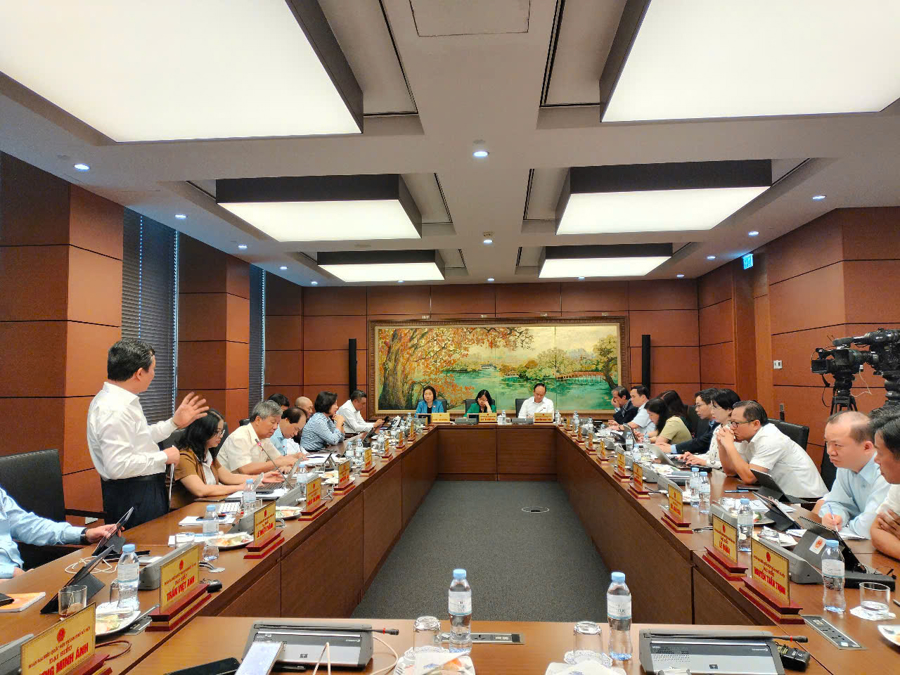
According to the delegate, this budget revenue figure is significant as it indicates a large budget surplus. In this challenging context, it is crucial to utilize this surplus rather than focusing solely on budget collection. We should use the budget to encourage and incentivize investment for development.
The delegate mentioned that the economic growth in 2024 relied on three traditional drivers: exports, consumption, and investment.
However, in 2025, the export driver faces challenges due to tax policy issues with the United States. This difficulty has two distinct consequences. Firstly, the entire manufacturing sector, which previously drove growth, will decline this year. This is evident from the Purchasing Managers’ Index, which stood at 50.5 points in March 2025 but dropped to 45.6 points in April. A score of 50 indicates stable production, while a lower score means a contraction. This contraction not only affects production volume but also reduces jobs and incomes for workers in the export-oriented manufacturing industry. Consequently, a decrease in income may further impact consumption motivation.
Additionally, the US tax policy will influence foreign-invested enterprises in Vietnam. FDI inflows into Vietnam may stagnate, and FDI disbursements will likely decrease. When FDI disbursements and exports decline, the country’s foreign reserve will be affected, impacting the exchange rate.
“This indicates that production and exchange rate pressures in the macroeconomy will be challenging in 2025,” said Professor Hoang Van Cuong.
PROTECTING THE DOMESTIC MARKET, MAINTAINING TRADITIONAL MARKETS, AND EXPANDING INTO NEW ONES
To achieve the 8% growth target for 2025, along with the comprehensive solutions that the government has been actively implementing and those presented in the report, Delegate Hoang Van Cuong proposed several focused and urgent solutions.
While negotiations on tax issues with the US are ongoing, Vietnam must maintain its traditional export markets, with China being a prominent example. However, the delegate pointed out that agricultural exports to China have significantly decreased in the first months of the year, especially for durian due to quality control issues.
“To maintain traditional markets and expand into new ones in the Middle East and Europe, the state needs to guide farmers in producing export-oriented agricultural products, providing standards, and promoting sustainable exports,” suggested Delegate Hoang Van Cuong.

Along with this, there is a need for immediate support measures for exporting businesses through an “export bonus” policy. I propose that during this period, we should implement an “export bonus” policy,” the delegate suggested.
Accordingly, enterprises that export desired products to target markets will receive bonuses based on their export volume. This policy will encourage and support exporting businesses during challenging times.
Professor Hoang Van Cuong also emphasized the importance of protecting the domestic market, preventing smuggling, and combating trade fraud. The delegate stated that the domestic market is under significant pressure due to the influx of goods from countries unable to export to the US, which may “flow” into neighboring countries, including Vietnam. “If we are not careful, these goods will compete with and potentially destroy domestic products. Therefore, we must protect our domestic market,” said Delegate Hoang Van Cuong.
Recently, the Prime Minister has directed a resolute fight against counterfeit and smuggled goods. The delegate emphasized that “if we do not decisively prevent smuggling, it will be dangerous, even involving the issue of transferring goods into the country and then relabeling them… which could potentially destroy domestic production.”
The Hanoi delegate suggested the need for persistent and thorough action to control the market for counterfeit and smuggled goods, as well as to combat trade fraud. Controlling counterfeit and smuggled goods will also contribute to protecting and motivating the development of the private economy. In reality, traditional goods and well-known enterprises have struggled to survive due to competition from counterfeit products.
The delegate also proposed promoting domestic consumption. In addition to the 2% VAT reduction to encourage consumption, it is necessary to extend the time for implementing certain laws, such as the Law on Special Consumption Tax. Furthermore, taxes, fees, and land rent for businesses should continue to be postponed or waived.
Policies to attract international tourists should be encouraged by experimenting with reduced (or even waived) visa fees until the end of the year and shortening the time for visa issuance. Additionally, bonuses should be considered for tours that attract tourists from priority markets with high purchasing power.
Notably, the delegate suggested promoting the night-time economy by providing support with premises, tax exemptions, relaxed control measures, and unrestricted operating hours for night-time economic activities in tourist centers to attract tourists.
PROPOSAL TO EXPAND THE MECHANISM FOR LEGAL OBSTACLE REMOVAL FOR STAGNANT REAL ESTATE PROJECTS
Regarding investment motivation, although the government is vigorously promoting it, the delegate believes that public investment in 2025 will face challenges. Therefore, it is essential to shift from traditional public investment to encouraging and attracting private investment.
The National Assembly has recently passed Resolution 198/2025/QH15 on special mechanisms and policies to develop the private economy to implement Resolution 68-NQ/TW of the Politburo on developing the private economy. This will create a strong impetus to encourage enterprises to participate in economic development. The delegate suggested expediting the mechanism for government orders to large enterprises for implementing state investment projects and public investment projects, contributing to the rapid disbursement of public investment capital and creating a spillover effect for the development of other enterprises.
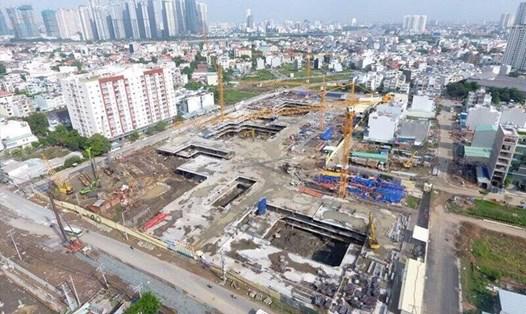
According to Professor Hoang Van Cuong, one of the sectors with the most significant capital increase is real estate. In this phase, it is necessary to encourage real estate growth and remove legal obstacles for stagnant real estate projects.
According to the Ministry of Finance, there are currently more than 2,200 real estate projects with a total investment of 5.9 million billion VND and the use of nearly 350,000 hectares of land that are suspended due to legal issues. Therefore, the delegate proposed allowing the replication of mechanisms like National Assembly Resolution 170/2024/QH15, which allowed the removal of obstacles for projects in Ho Chi Minh City, Da Nang, and Khanh Hoa, for other projects nationwide to unlock stagnant resources.
“If these resources are unlocked, they will significantly contribute to growth in this phase,” said Delegate Hoang Van Cuong. Additionally, focusing on the rapid development of social housing will create sustainable growth.
Governor Nguyen Thi Hong: The Bad Debt of the Credit System is Currently High and on the Rise, Posing Significant Challenges for the Banking Sector
The governor emphasized the urgency of providing liquidity support to commercial banks through special lending facilities to ensure the safety and security of the credit system. Synchronizing the legal framework for dealing with non-performing loans will facilitate capital rotation and enhance credit accessibility for citizens and businesses alike.
“PM Calls for Review of Officials in Areas with Slow Public Investment Disbursement”
Recapping the results of public investment in the first months, with 37 out of 47 ministries and agencies and 27 out of 63 localities having a disbursement rate below the national average, the Prime Minister requested to clarify this issue, identify the causes, and point out the difficulties, obstacles, bottlenecks, and responsibilities of the ministries and sectors. He asked, “Why, with the same conditions and policies, do some places perform well while others do not? Is it due to the people or the leaders?”
“National Movement for Prosperity: Vietnam’s Race to Thrive”
“Vietnam is set to prioritize the development of its private sector. With a renewed focus on fostering a vibrant and diverse economy, the country aims to unleash the potential of its private enterprises. This strategic shift marks a pivotal moment in Vietnam’s economic journey, signaling a departure from traditional models and embracing a future driven by innovation and entrepreneurial spirit.”
“Navigating Economic Competition in a Globalized World: Insights for Vietnam’s Prosperity”
On April 8, 2024, Singapore’s Prime Minister delivered a speech to the nation’s parliament that sent shockwaves around the world. In his address, Lawrence Wong told the people of Singapore that the “era of rules-based globalization and free trade is over, and Singapore must take action.” But why does the topic of “globalization” continue to captivate and concern the global community?

